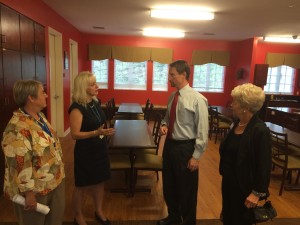
ATLANTA— State Representative Andy Welch (R-McDonough), Chairman of the House Study Committee on Licensing and Inspection of Child Welfare Providers, recently led the committee’s final hearing on Monday, September 29 at the state capitol. At the meeting, the study committee released its recommendations based on the findings from a series of hearings.
“In the committee’s diligent review, we learned that licensing and contractual oversight of child welfare providers overlaps among multiple state agencies,” said Rep. Welch. “Oversight is necessary to protect the safety of children in the state’s care; but when oversight is unnecessarily duplicative, as is the case in Georgia, it takes providers away from caring for the children. One of the many recommendations of the committee is that the agencies streamline the licensing, contracting and associated inspection process by promoting inter-agency coordination and communication.”
Below are highlights of the committee’s recommendations:
Consolidation of Annual Inspections
The committee recommends that annual licensing and contracting inspections be consolidated into inter-agency inspections for childcare providers. One recommendation is for a single inspection to be done on behalf of the Office of Residential Child Care (RCC), Department of Family and Children Services (DFCS), Department of Juvenile Justice (DJJ) and Department of Behavioral Health and Developmental Disabilities (DBHDD). All of these agencies currently conduct separate inspections. As an alternative, the committee also recommends that the Department of Human Services could consolidate all of its licensing, contracting, and associated inspections into one division and require that licensing and contract compliance be done by a single inspector.
Consolidation of Employee Background Checks
Another recommendation from the committee is to consolidate multiple employee background checks between agencies into a single provider screening. The committee requests that the chief counsel to the Department of Human Services (DHS) and DJJ file the appropriate petition with the U.S. Attorney General for authorization to share criminal background information between child-care regulating agencies. If authorization is denied, the committee asks that the chief counsel for DHS and DJJ create a draft of proposed legislation that would authorize a single central agency to collect and screen criminal background information in compliance with federal regulations.
Data Sharing and Predictive Analytics
The committee recommends that the agencies consider a centralized data warehouse for provider inspection reports and compliance data. This data would be accessible to all relevant agencies so that appropriate information might be shared between agencies. Furthermore, the committee recommends creation of software that would use predictive analytics to identify certain risk factors that are indicative of child endangerment. To thoroughly consider the recommendation of data sharing and predictive analytics, the committee recommends the creation of a taskforce composed of child care providers and officials from affected agencies.
Public Scorecards
Another recommendation calls for the creation of a public scorecard for providers. This scorecard would be published in a single location for the public to review all grades that a provider has received from each of the various agencies. The committee recommends that the grades be based on empirical evidence, such as an established formula that considers compliance or noncompliance of applicable rules, policies and court orders. Within the report, the committee notes that a process should be established that would allow for providers to review and contest scores before they are published. Regulatory incentives and disincentives would be also based upon scorecard results. To thoroughly consider the recommendation of public scorecards, the committee recommends the creation of a taskforce composed of child care providers and officials from affected agencies.
Tax Incentives for Sponsorship of Foster Children
Finally, the committee recommends the creation of tax incentives that would encourage private donors to “sponsor” children in need of higher levels of agency oversight.
The committee compiled its recommendations with input obtained at four multi-hour public hearings, which were held over the course of two months. Testimony was heard by officials from the Department of Human Services, Office of Residential Child Care, Office of Provider Management, Department of Family and Children Services, Department of Juvenile Justice, Department of Public Health and Department of Behavioral Health and Developmental Disabilities. Childcare providers and other interested parties also provided feedback. Committee members gained further knowledge of child welfare providers by touring CHRISKids. CHRISKids is a child welfare facility that serves abused and neglected youth in the Metro Atlanta area.
“I very much appreciate the thoughtfulness of committee members and the knowledgeable professionals both in State government and in the child welfare community who provided our committee with outstanding feedback. I am truly inspired by their dedication to the health and safety of Georgia children,” said Rep. Welch. “I would also like to thank CHRISKids for allowing the committee to tour one of its facilities. It was a great opportunity for us to see first-hand how State regulations impact the provider community and how the State might improve its oversight.”
Created by House Resolution 1723, the committee was charged with reviewing Georgia’s existing licensing, inspection and placement processes for public and private child welfare providers. The committee also sought to determine the effectiveness of such processes, address the state interest in the safety of children and ensure that safe conditions and services are provided to children and youth.
Chairman Welch and the six other members of the committee were appointed by Speaker David Ralston (R-Blue Ridge). Members of the committee are Rep. Joyce Chandler (R – Grayson), Rep. Penny Houston (R – Nashville), Rep. Mary Margaret Oliver (D – Decatur), Rep. Kevin Tanner (R – Dawsonville), Rep. Tom Weldon (R – Ringgold), Rep. Wendell Willard (R – Sandy Springs).
To view a video of the meeting, please click here.
Representative Andrew Welch represents the citizens of District 110, which includes portions of Butts, Henry, and Newton Counties. He was elected into the House of Representatives in 2010, and currently serves as the Vice Chairman on the Code Revisions Committee and the Appropriations Subcommittee on Economic Development. He also serves on the Judiciary, Juvenile Justice, and Regulated Industries committees.
###